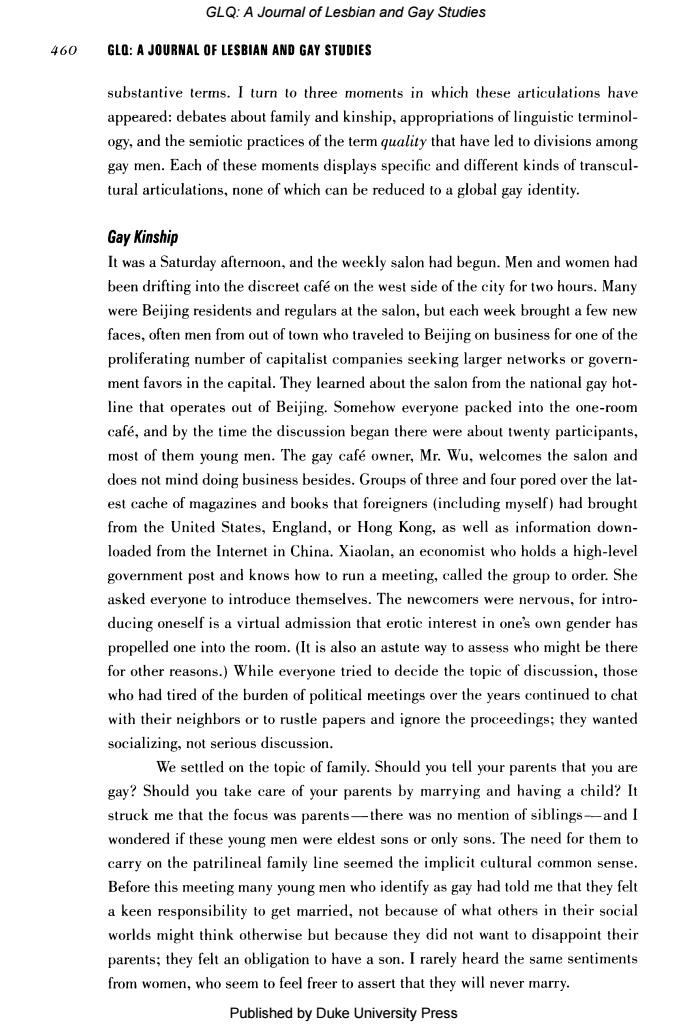正在加载图片...

GLQ:A Joumal of Lesbian and Gay Studies 460 GLQ:A JOURNAL OF LESBIAN AND GAY STUDIES substantive terms.I turn to three moments in which these articulations have appeared:debates about family and kinship,appropriations of linguistic terminol- ogy,and the semiotic practices of the term quality that have led to divisions among gay men.Each of these moments displays specific and different kinds of transcul- tural articulations,none of which can be reduced to a global gay identity. Gay Kinship It was a Saturday afternoon,and the weekly salon had begun.Men and women had been drifting into the discreet cafe on the west side of the city for two hours.Many were Beijing residents and regulars at the salon,but each week brought a few new faces,often men from out of town who traveled to Beijing on business for one of the proliferating number of capitalist companies seeking larger networks or govern- ment favors in the capital.They learned about the salon from the national gay hot- line that operates out of Beijing.Somehow everyone packed into the one-room cafe,and by the time the discussion began there were about twenty participants, most of them young men.The gay cafe owner,Mr.Wu,welcomes the salon and does not mind doing business besides.Groups of three and four pored over the lat- est cache of magazines and books that foreigners(including myself)had brought from the United States,England,or Hong Kong,as well as information down- loaded from the Internet in China.Xiaolan,an economist who holds a high-level government post and knows how to run a meeting,called the group to order.She asked everyone to introduce themselves.The newcomers were nervous,for intro- ducing oneself is a virtual admission that erotic interest in one's own gender has propelled one into the room.(It is also an astute way to assess who might be there for other reasons.)While everyone tried to decide the topic of discussion,those who had tired of the burden of political meetings over the years continued to chat with their neighbors or to rustle papers and ignore the proceedings;they wanted socializing,not serious discussion. We settled on the topic of family.Should you tell your parents that you are gay?Should you take care of your parents by marrying and having a child?It struck me that the focus was parents-there was no mention of siblings-and I wondered if these young men were eldest sons or only sons.The need for them to carry on the patrilineal family line seemed the implicit cultural common sense. Before this meeting many young men who identify as gay had told me that they felt a keen responsibility to get married,not because of what others in their social worlds might think otherwise but because they did not want to disappoint their parents;they felt an obligation to have a son.I rarely heard the same sentiments from women,who seem to feel freer to assert that they will never marry. Published by Duke University Press460 GLO: A JOURNAL OF LESBIAN AND GAY STUDIES substantive terms. I turn to three moments in which these articulations have appeared: debates about family and kinship, appropriations of linguistic terminology, and the semiotic practices of the term quality that have led to divisions among gay men. Each of these moments displays specific and different kinds of transcultural articulations, none of which can be reduced to a global gay identity. Gay Kinship It was a Saturday afternoon, and the weekly salon had begun. Men and women had been drifting into the discreet caf6 on the west side of the city for two hours. Many were Beijing residents and regulars at the salon, but each week brought a few new faces, often men from out of town who traveled to Beijing on business for one of the proliferating number of capitalist companies seeking larger networks or government favors in the capital. They learned about the salon from the national gay hotline that operates out of Beijing. Somehow everyone packed into the one-room cafk, and by the time the discussion began there were about twenty participants, most of them young men. The gay caf6 owner, Mr. Wu, welcomes the salon and does not mind doing business besides. Groups of three and four pored over the latest cache of magazines and books that foreigners (including myself) had brought from the United States, England, or Hong Kong, as well as information downloaded from the Internet in China. Xiaolan, an economist who holds a high-level government post and knows how to run a meeting, called the group to order. She asked everyone to introduce themselves. The newcomers were nervous, for introducing oneself is a virtual admission that erotic interest in one's own gender has propelled one into the room. (It is also an astute way to assess who might be there for other reasons.) While everyone tried to decide the topic of discussion, those who had tired of the burden of political meetings over the years continued to chat with their neighbors or to rustle papers and ignore the proceedings; they wanted socializing, not serious discussion. We settled on the topic of family. Should you tell your parents that you are gay? Should you take care of your parents by marrying and having a child? It struck me that the focus was parents-there was no mention of siblings-and I wondered if these young men were eldest sons or only sons. The need for them to carry on the patrilineal family line seemed the implicit cultural common sense. Before this meeting many young men who identify as gay had told me that they felt a keen responsibility to get married, not because of what others in their social worlds might think otherwise but because they did not want to disappoint their parents; they felt an obligation to have a son. I rarely heard the same sentiments from women, who seem to feel freer to assert that they will never marry. GLQ: A Journal of Lesbian and Gay Studies Published by Duke University Press